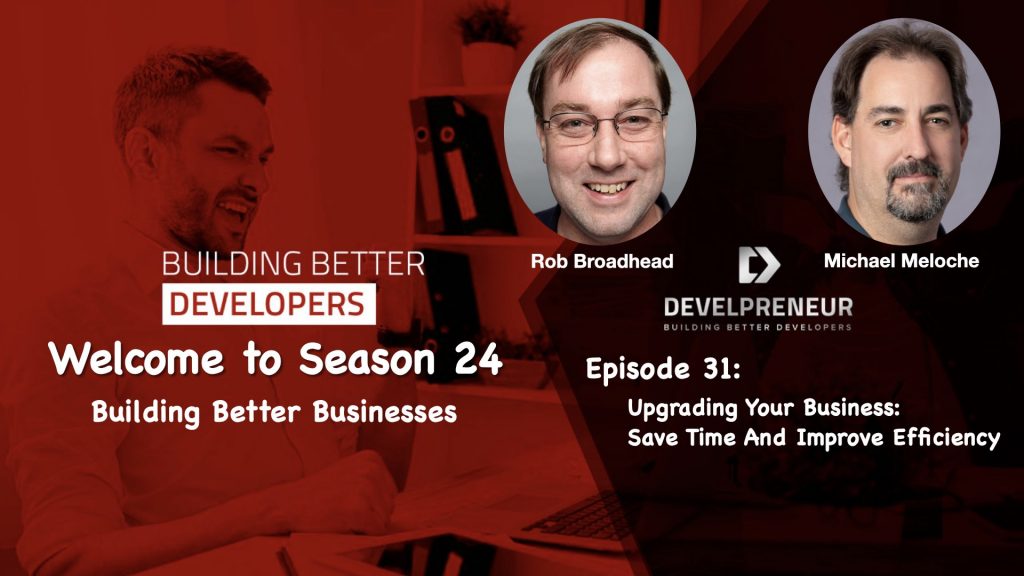Upgrading your business is more than a buzzword — it’s a strategic mindset. In this episode of the Building Better Developers podcast, Rob Broadhead and Michael Meloche explore what it really means to upgrade your business in today’s fast-moving, tech-driven world. From tools and processes to training and hiring decisions, they offer practical advice for business owners ready to make smarter, more efficient moves.
What Upgrading Your Business Really Means
Upgrading your business means taking a proactive approach to making it more efficient, productive, and resilient. It’s not just about buying new hardware or using trendy software — it’s about improving the way your business operates at every level.
Rob Broadhead explains how boutique consulting — like the kind offered by Developer Nation — goes beyond just staffing and focuses on solving the right problems. By identifying a business’s unique strengths and removing friction in daily operations, upgrading becomes a strategic investment in growth.
“We’re not here to throw hours at a project. We help you solve real problems with focused solutions.”
– Rob Broadhead
Upgrading Your Business Tools: Are You Falling Behind?
One of the easiest ways to start upgrading your business is by evaluating the tools your team uses every day. Rob reflects on the days when a computer could take five minutes to boot up — a daily delay that adds up over time.
Whether it’s modern laptops, cloud platforms, or extra monitors, the right tools can unlock better productivity. And while Michael loves open-source solutions, he emphasizes that businesses need to weigh the cost of learning against the speed of implementation.
“Are you spending more time learning the tool than using it? That’s the key question.”
– Michael Meloche
Upgrade Your Team: Train or Hire?
Another area where upgrading your business pays off is in your people. Rob and Michael tackle the classic dilemma: should you train your current team or hire experienced professionals?
Rob favors investing upfront in talent that can hit the ground running. Michael agrees — but says strategic training also works when you have committed long-term staff. Either way, upgrading your workforce ensures you don’t waste time on preventable errors and inefficiencies.
“Hiring cheap cost us more in the long run. Upfront investment saved us months.”
– Rob Broadhead
Don’t Forget Security, Compliance & Maintenance
Upgrading your business also means protecting it. Michael stresses the importance of staying compliant with software licenses and keeping systems secure and updated — especially in industries like healthcare, banking, or legal services.
“You can’t afford to overlook compliance and security in today’s business climate.”
– Michael Meloche
Watch for Time Wasters
The hosts encourage listeners to pay attention to how time is being used (or wasted). Whether it’s slow software, outdated equipment, or inefficient workflows, these “thieves of time” are often overlooked but easy to fix with the right upgrades.
“Upgrading your business might mean replacing an old monitor — or rethinking how your team spends its day.”
– Rob Broadhead
This Week’s Challenge: Start Upgrading Your Business
This week, spend time auditing your business. Watch how employees work, where delays happen, and what causes frustration. Then make a short list of the easiest wins: faster internet, clearer processes, better equipment. Even a small improvement today can save hours next month.
Stay Connected with Developer Nation
Liked the episode? Subscribe on your favorite podcast platform or catch the video version on YouTube.
Contact Rob and Michael at or visit [email protected] to leave feedback and suggest topics for the next season.
Follow along on X @Develpreneur and YouTube for regular insights, challenges, and tips to build a better business. We are also on Facebook and LinkedIn.

